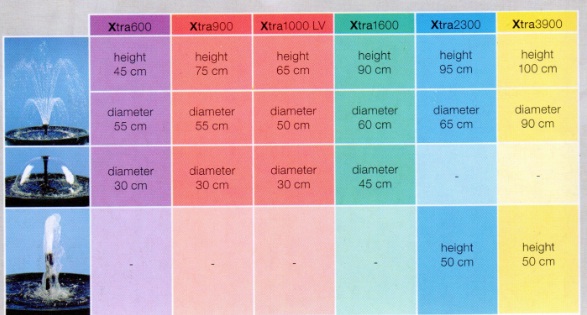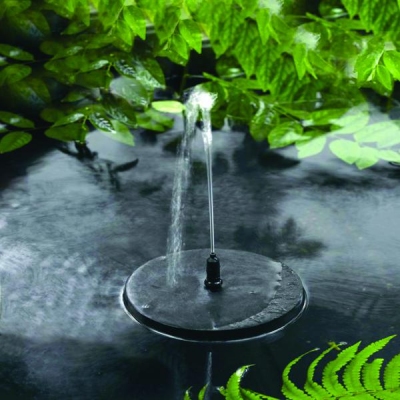Which pump is right for my pond?
Ponds do not need to have a pump, you may want to go for the natural look but many people do choose to install a pump as they have many benefits.
Installing a pump into your pond not only makes it look attractive and creates a sound in your garden but also aerates the water reducing the build-up of algae and if you have fish in the pond providing them with much needed oxygen.
What size pump do I need?
The size of the pump really depends on what you want to do with it. If it’s for a fountain then most pumps come with a variety of fountain attachments to create varied effects once in the pond. Fountain pumps start at 900 litres per hour and range up to 20,000 depending on the size of the pond and of course budget.
If the pump is to run a fountain and a filter then it needs to be bigger, the quantity of water will dictate this. If you have an average size pond we suggest running the pump for at least 3-4 hours per day to create a reasonable amount of oxygen within the pond.
It is always better to choose a bigger pump which can be turned down rather than a smaller pump which cannot be turned up.
Below is useful guide based on a range of Libel Xtra pumps which we currently stock. The Libel pumps range from 600 litres per hour up to 3,900 litres per hour. These pumps are all 240 volt and come with a 2 year warranty.
What pumps are available to buy?
The choice of pond pump is really up to you. We tend to find that customers who require a pump to run a fountain or water feature and a filter are better off buying two separate pumps to ensure they have the maximum amount of flow to each output. Customers also sometimes prefer separate pumps as the filter pump is something which can be left to run during the night. Would your neighbours approve of a large gushing fountain running all night? These are all considerations to look at when deciding on which pump to purchase.
The running costs are also something to look at, cheaper pumps can often have a much higher wattage than slightly more expensive pumps and over time this can end up costing a fair bit more in electric to run. Simple calculations can be made based on your electrical rates at home, the wattage of the pump you plan to buy and how many hours per day it will be running for.
Many filter pumps are designed to run 24 hours a day, 7 days a week. Fountain pumps prefer to run in shorter intervals and as mentioned earlier are ideally suited to be turned off at night.
When looking to purchase a pond or water feature pump you will need to consider the power requirements, whether the pump is low voltage or mains powered. 95% are now mains powered due to the size of the pumps and the flow rates. Mains pumps can be wired into a junction box within the garden, fed through a house or garage wall or even plugged into an outdoor socket. Wherever the pump is plugged into we recommend fitting the plug with an RCD.
 Solar Pumps
Solar Pumps
If there is no electricity supply in your garden and you would prefer not to go to the expense of having a socket fitted to the house then solar is an option which is becoming more and more popular in the UK and Europe.
We offer two varieties of solar pumps, ‘floating panels’ and ‘land based panels’. Floating panels simple float as part of the fountain on the surface of the water with built in solar cells pointing upwards to the sky. These pumps are quite small and do require a fair amount of direct sunlight to work. Clean the solar cell regularly to ensure that they trap as much sunlight as possible during the day.
Land based panels are separate to the actual fountain and feature and can be positioned towards the sun. These solar pumps come with between 2 and 3 metres of cable. Again like the floating panels these also require direct sunlight to operate and will need the panels cleaning regularly to maintain performance.
Currently we offer solar pumps in three sizes, 150 litres per hour, 300 litres per hour and 500 litres per hour.
UK Water Features stocks both mains powered fountain and water feature pumps along with solar powered pumps.







